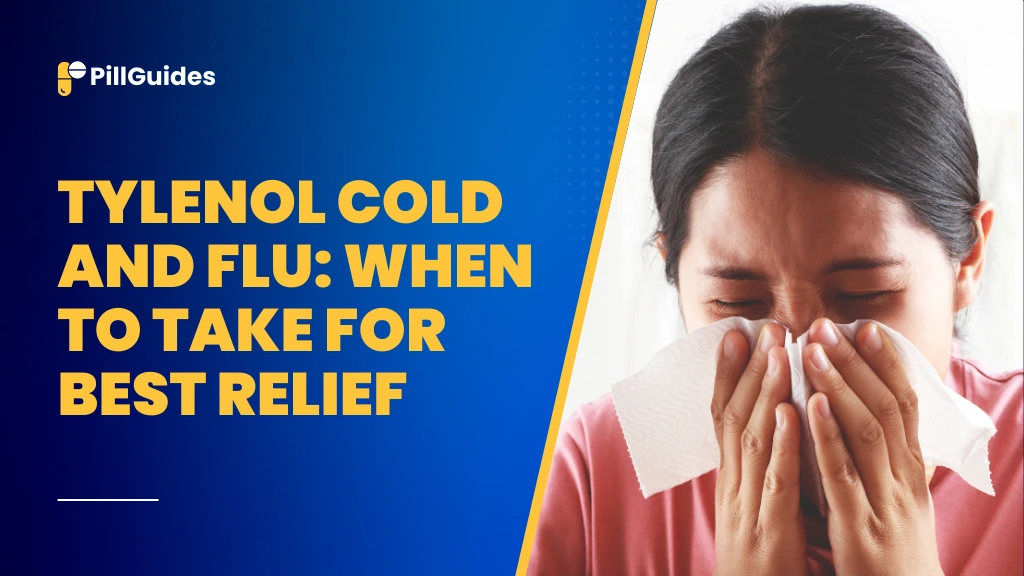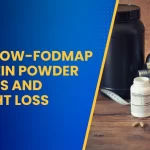During cold and flu season, it can be hard being cold and flu season, feeling so fatigued, congested miserable. If you’re feeling under the weather, finding relief fast is your priority. One of the most used over-the-counter medications, Tylenol Cold and Flu is to help with the symptoms of congestion, body aches, and fever. When should you take Tylenol Cold and Flu for maximum effectiveness? In this post, I’ll tell you the best times to take Tylenol Cold and Flu, how it works, and what to know before using it to manage cold and flu symptoms.
What is Tylenol Cold and Flu?
Tylenol Cold and Flu is an over-the-counter medication designed to relieve multiple symptoms associated with colds and flu, including:
- Fever
- Body aches
- Congestion
- Runny nose
- Headache
Acetaminophen gives relief from fever and body aches, while other ingredients in the product include diphenhydramine (an antihistamine), phenylephrine (a decongestant), and dextromethorphan (a cough medicine). This target is wide enough to target the symptoms of cold and flu the symptoms typically a combination of. But taking Tylenol Cold and Flu at the right time will make it work the best.
When to Take Tylenol Cold and Flu?
Getting the best results with Tylenol Cold and Flu takes knowing when to use it. However, it is tempting to take it as soon as you begin to feel sick, but both timing and dosage are important. Here’s a breakdown of the best times to take this medication:
1. Take It At the First Sign of Symptoms
The sooner you take Tylenol Cold & Flu, the sooner you’ll feel better. Once you start to have body aches, a fever, or congestion, try taking the medicine early to assist in managing symptoms before they get worse.
2. Take It Every 4-6 Hours
Tylenol Cold and Flu should be taken every 4 to 6 hours for effective relief. But you should never take it over what’s recommended. Acetaminophen can do serious damage to your liver if you take too much of it. Never take this medicine in larger or smaller amounts than recommended without first talking with your doctor.
3. Take It With Food or Water
Some people experience stomach irritation with this medication, but this can be reduced when taken with a full glass of water or food if you have a sensitive stomach.
4. Avoid Taking Too Close to Bedtime
Diphenhydramine, an antihistamine known to cause drowsiness, is in Tylenol Cold and Flu. Taking the medication in the evening helps you sleep, but beware not to take it too late because you don’t want to feel drowsy the next day.
How Does Tylenol Cold and Flu Work?
Tylenol Cold and Flu take on multiple symptoms at once. An acetaminophen (Tylenol) reduction in fever and pain from body aches and headaches is its main ingredient. Diphenhydramine acts as an antihistamine so it will reduce sneezing and runny nose, phenylephrine is a decongestant that will work well in relieving nasal congestion. Their last operation is to serve as a cough suppressant, blocking the lack of dextromethorphan in cooling when coughing.
Precautions to Consider When Taking Tylenol Cold and Flu
Before reaching for Tylenol Cold and Flu, it’s essential to consider certain precautions to avoid adverse reactions:
- Don’t Exceed the Recommended Dose: Do not exceed the recommended dosage on the package and, for example, never take more acetaminophen than is recommended.
- Avoid Alcohol: Acetaminophen interacts poorly with alcohol and increases your risk for damage to your liver.
- Consult Your Doctor if Pregnant or Nursing: This medication should not be used by pregnant or breastfeeding women without first talking to your doctor.
- Check for Other Medications: Always take acetaminophen with care if you’re taking other medications, including those you purchase over the counter to avoid taking too much acetaminophen.
- Pre-existing Conditions: Tylenol Cold and Flu is not recommended for people with liver disease, high blood pressure, or heart conditions.
Side Effects of Tylenol Cold and Flu
Tylenol Cold and Flu will provide you with symptom relief but the medicine can have side effects, especially when not used as instructed. Some common side effects include:
- Drowsiness
- Dizziness
- Nausea
- Stomach upset
Rarely, it may cause more serious problems such as liver problems, allergic reactions, or heart trouble. If you have noticed symptoms like an unusual yellowing of the skin or eyes or trouble breathing, or if you have swelling of the face, arms, hands, legs, or feet, see a doctor immediately.
Tips for Safe and Effective Use of Tylenol Cold and Flu
Understanding how to use Tylenol Cold and Flu safely and effectively is critical to benefit from the product. Here are some essential tips to ensure you get the most out of this medication while avoiding potential side effects:
1. Follow the Recommended Dosage
Follow the dosage instructions pictured on the pack or as described by your doctor exactly. Remember that too much acetaminophen can severely damage the liver.
2. Avoid Alcohol
Do not drink alcohol if you are taking Tylenol Cold and Flu. Alcohol is bad for your liver and can raise the risk of liver damage and make the side effects of these drugs even worse, like drowsiness and dizziness.
3. Take With Food or Water
The medication is taken by mouth with or after a full glass of water or food if you have a sensitive stomach. It can also help lower the odds of nausea or stomach irritation.
4. Time Your Doses Carefully
Follow your doctor’s directions for taking the medication, usually every 4 to 6 hours as needed, but do not take more than the maximum dose for a day. Don’t take it too close to bedtime if it might make you drowsy and not alert the next morning.
5. Be Cautious of Drug Interactions
Do not take Tylenol Cold and Flu with any other medications containing acetaminophen without consulting your doctor first. Talk with your doctor or pharmacist before using this product to make sure you don’t take too much.
6. Know When to Avoid the Medication
Do not use Tylenol Cold and Flu if you have preexisting conditions including liver disease, high blood pressure, or problems with your heart.
7. Monitor for Side Effects
Notice if you have some of the common side effects: drowsiness, nausea, or dizziness. Rarely, serious side effects such as yellowing of the skin, swelling, or breathing problems may happen. If you notice
Conclusion
Tylenol Cold and Flu works great to take care of cold and flu symptoms, but knowing when to take Tylenol Cold and Flu makes a huge difference in how quickly and efficiently it works. The medication can do its thing if you take it at the right time, and of course so can you – provided you know the proper dosage, and take precautions. If you have pre-existing conditions or any concerns you should always consult your doctor before medicating.
Disclaimer
The information provided in this blog post is for general informational purposes only. Always consult with a healthcare provider or pharmacist before using any medication, especially if you have underlying health conditions or are taking other medications.
Read More: DayQuil Severe Cold and Flu Dosage: A Complete Guide
FAQs
1. Can you use Tylenol Cold and Flu for a cough?
Tylenol Cold and Flu, yes, it has dextromethorphan as a cough suppressant, this is good for coughs caused by cold and flu.
2. When does Tylenol Cold and Flu begin to work?
It takes Tylenol Cold and Flu about 30 to 60 minutes to start working and up to several hours for the full effects to surface.
3. Can I drink Tylenol Cold and Flu at the same time with other cold medication?
Before mixing any other cold medication with Tylenol Cold and Flu it’s best to look for the ingredients to make sure they aren’t taking too much of one active ingredient such as acetaminophen. As such, you’re advised to always consult your doctor or pharmacist.
4. Can Tylenol Cold and Flu be used by healthy children?
Tylenol Cold and Flu should not be used in children without a doctor’s instruction. No dosage information is available regarding children under age 12, and the dosing should be based on your child’s age and weight.
5. If you do have high blood pressure, can you take Tylenol Cold and Flu?
Tylenol Cold and Flu should not be used by people with high blood pressure unless a doctor recommends it because the decongestant phenylephrine can raise blood pressure.










